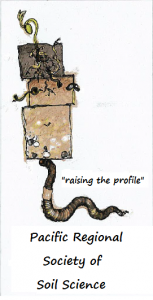The Pacific Regional Society of Soil Science presented their 34th Spring AGM and Workshop: Soil Water Dynamics In Urban, Agricultural and Wetland Ecosystems
 Saturday March 25th, 2017 (9AM – 4PM)
Saturday March 25th, 2017 (9AM – 4PM)
University of British Columbia, Vancouver (MacMillan Building – click for a map)
This year’s workshop included expert soil scientists knowledge from around the province to discuss issues related to land use management and soil water dynamics. We had engaging seminars, vibrant panel discussions and informative workshops.
Click here to view photos!
- Hans Schreier (Keynote) – Extreme Climatic Events & Land Use Intensification: A New Challenge for Water Management
- Richard Boase – Urban Soil Water Design and Management
- Albert Leung and Siddhartho Paul – Irrigation Water Quality and its Implication for Soil Management in Fraser Delta
- Tom Pypker – Potential Impact of Climate Change on Greenhouse Gas Emissions from sub-Boreal Peatland
A Summary of the Day
by John Prizzi (graduate student in the Master of Land and Water Systems, UBC)
Wow, what a Saturday I had at the PRSSS 34th annual AGM and workshop featuring speakers from a wide array of backgrounds and disciplines to ruminate on the topic of soil water dynamics within a multitude of ecosystems including, but not limited to, urban, agricultural, and wetland ecosystems. My day started off with the keynote presentation by Dr. Hans Schreier, who delivered a sobering talk on the marriage of extreme climatic events and our own land use intensification. Featured in his presentation were roughly 75 different figures, charts, and graphs explaining increasing temperature trends, historical water use data in various locations throughout British Columbia, and proposed future management solutions to combat the inherent issues the come with water scarcity. Hans concluded that human activity is perpetually unpredictable and trends seen within one community are hardly indicative of trends within another.
Our next speaker was Mr. Rischard Boase, a geologist by training. The focus of Mr. Boase’s talk was on the rise of impervious surfaces within urban Vancouver with implications to other urbanizing areas. He discussed how it has been common practice for construction companies to strip top soil from the site before building and either covering the entire area completely or sodding over the areas stripped of the topsoil affecting the soil system. An increase of impervious surfaces can be detrimental in an urban setting with precipitation over 1,000 mm annually causing the runoff of pollutants such as metals and hydrocarbons and effectively making it impossible for water to infiltrate the soil. Mr. Boase is planning to work with construction companies and policy makers to preserve topsoil at construction sites and limit the amount of construction related impact.
A tag team combination was batting in the hole comprising of a duo that would have rivaled the Frankia sp. And the mighty Alder. Albert Leung and Sidd Paul. I can say these guys were trading back and forth with their presentation like masterful jazz musicians trading fours masterfully displaying the issues that can occur from salt water intrusions on agricultural land. An issue all too real, not just reserved for those box office blockbuster disaster movies pertaining to aggregate failure due to tidal waves flooding the land, in coastal locations. I was incredibly impressed when Albert mentioned with his causal charm, that he has a background in Environmental Fluid Dynamics. Both presenters blew my mind with their models.
Our fourth speaker was Tom Pypker, a charismatic man who spoke of peatlands in Michigan, a place he described as distant and unknown. Some soil humor. I laughed. Tom discussed issues with a rising water table impacting environmental performance through a lack of decomposition and anaerobic conditions. This led to a buildup of organic matter which prevented carbon dioxide release, normal with decomposition but in an extreme and ironic twist of fate led to increased emission of methane which was a byproduct of anaerobic decomposition. Truly, a rock and a hard place. Or should I say, a rock and heavily mechanically compacted glacial-lacustrine deposit.
After lunch, I attended but one more discussion on efficient irrigation practices through the use of online mapping and soil information. It was a light talk that featured full audience participation and I helped bring to light just how inefficiently some irrigation practices and systems are. Since irrigation can be seen as taking fresh water and dumping on the dirt, obviously with the intention to grow food, I can completely understand why increasing efficiency is important.
That was my day at the 34th Annual PRSSS Spring AGM and Workshop. I had a great time, met some wonderful people, and even got a free coaster for my beverage. Thank you to everyone who made my day so great. I can’t wait for next year.
REGISTRATION INCLUDED YOUR MEMBERSHIP FEES FOR 2017-2018: $70-regular and $25-students.
